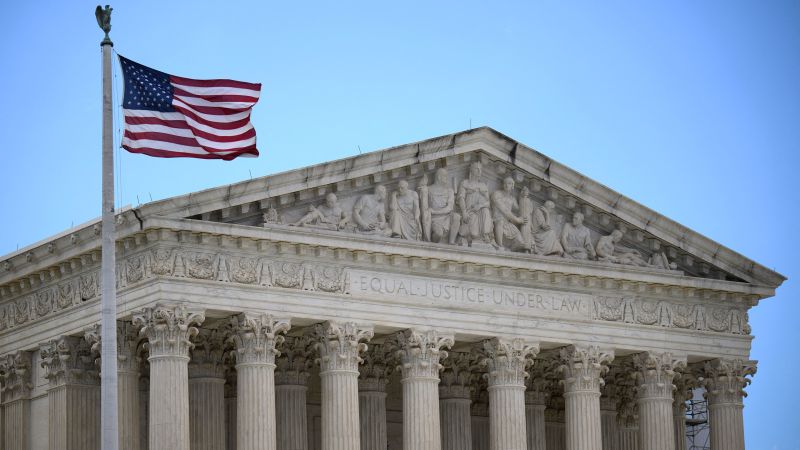Copyright Cable News Network

When David Levi was laid off a few years ago, he turned to his theremin. The electronic instrument, which musicians play by waving their hands between two “antennas,” became the inspiration for a business, MicroKits. Today, the Virginia-based company sells electronic kits that people can use to build their own theremin – learning about electronics and music in the process. The problem for MicroKits is that most of the electronic components it uses for those kits are made in China. Levi represents one of several small- and medium-sized businesses that have brought the fight over the tariffs to the nation’s highest court. Other companies include a New York-based wine and spirits importer and an Illinois-based educational toy company. Levi told CNN that his production rate is down about 40% because of the tariffs. The biggest problem, Levi said, is the uncertainty. “It’s hard to make business decisions when there’s no warning,” he said. Levi said he is concerned about the impact on his business if the court sides with Trump in the case. “More importantly,” he said, “a bunch of kids, instead of building a circuit for the first time this Christmas, maybe they’ll just watch more videos on the internet.” The landmark tariff case being argued in the Supreme Court on Wednesday stems from President Donald Trump’s novel use of a law known as the International Emergency Economic Powers Act (IEEPA) to impose higher border taxes. Upon declaring a national emergency, the law enacted in 1977 grants a president unique powers to “deal with an unusual and extraordinary threat.” The law does not explicitly specify tariffs as one of those applicable tools. The Trump administration has been arguing, though, because it states a president can “regulate … importation,” it can be taken to mean impose higher tariffs. However, no other president has used the law that way. Rather, presidents have invoked IEEPA mainly to sanction foreign governments, businesses or individuals or to introduce embargoes on other nations’ imports. Even though President Donald Trump will not be attending the arguments in person on Wednesday, his heightened rhetoric is all over the case. The Justice Department has used striking language to warn the justices about what might happen if the court ultimately rules against the administration. While the rhetoric is common in social media posts, briefs at the Supreme Court tend to be more stolid endeavors. Solicitor General D. John Sauer has quoted administration officials framing a loss as a “catastrophic” and “ruinous” outcome that would lead to a “dangerous diplomatic embarrassment.” Upholding the lower courts, the administration said, would “accelerate the drift toward America’s decline into a vassal state.” The tariffs are needed, Sauer has argued, “to rectify America’s country-killing trade deficits and to stem the flood of fentanyl and other lethal drugs across our borders.” That language is clearly designed to give the justices pause about the practical implications of their decision, even though most of the justices have long espoused the idea that they make decisions based on the law as they find it, not on potential consequences. The Supreme Court has been clear in case after case involving former President Joe Biden that an administration cannot take certain actions without explicit authorization from Congress. That is particularly true, the court has repeatedly ruled, when policies involve “major” political or economic questions. Enter the “major questions doctrine,” or the idea that Congress must explicitly authorize an administration to take certain actions. Vague, undefined words, the court has ruled, are not enough when it comes to “major questions.” Two years ago, the court’s conservative majority relied on that doctrine to block Biden’s student loan forgiveness plan. A year earlier, the court stopped Biden’s vaccine and testing requirement for 84 million Americans, concluding that Congress never explicitly gave the government the power to demand those measures during the Covid-19 pandemic. One of the questions in the case is whether the doctrine should apply at all – the businesses say “yes” and the Trump administration disagrees. The administration has argued that the doctrine should not apply when a president is exercising his power in the context of foreign affairs. Read more. Benjamin Gutman, the top appellate lawyer for the state of Oregon, is representing a dozen states that also sued Trump over the emergency tariffs. Gutman, a Yale Law School graduate and former administrative judge for the US Merit Systems Protection Board, is making his debut argument at the Supreme Court. While the small businesses challenging Trump focused on the tariffs intended to address trade imbalances, the states also sued over the tariffs designed to combat the trafficking of fentanyl. In addition to Oregon, the states that sued include Arizona, Colorado, Connecticut, Delaware, Illinois, Maine, Minnesota, Nevada, New Mexico, New York and Vermont. Gutman served as a deputy solicitor general in New York and as an appellate attorney for the US Equal Employment Opportunity Commission. The small- and medium-sized businesses challenging President Donald Trump’s tariffs are being represented by one of the best-known Supreme Court litigators in the business: Neal Katyal. A former acting US solicitor general in the Obama administration, he has argued more than 50 cases at the Supreme Court, including a blockbuster case a few years ago about a Catholic foster care agency in Philadelphia that wanted to decline screening same-sex couples. Katyal, a partner at the Milbank firm who previously clerked for Justice Stephen Breyer, successfully challenged military tribunals at Guantanamo Bay and defended a 40-foot cross on public land in Maryland against a challenge that it violated the First Amendment’s establishment clause. Several prominent Supreme Court attorneys were seeking to represent the businesses challenging the law. Katyal ultimately won the opportunity after a coin toss. President Donald Trump is being represented by an attorney who has enjoyed significant success at the Supreme Court in recent months: US Solicitor General D. John Sauer. Sauer, a Rhodes Scholar who clerked for the late Justice Antonin Scalia, will have the floor for about 40 minutes. The administration’s top appellate attorney has been on a winning streak at the Supreme Court, successfully convincing the court to sign off on Trump’s policies in nearly two dozen emergency cases this year. He also won a major case earlier this year limiting the power of courts to step in and block the president’s policies on a nationwide basis in the short term. But Sauer is still probably best known for arguing the Supreme Court case last year that led to Trump receiving broad immunity from criminal prosecution. Given the importance of that case for Trump, it was no surprise the president tapped him last year to serve as his top appellate attorney in the Justice Department.



